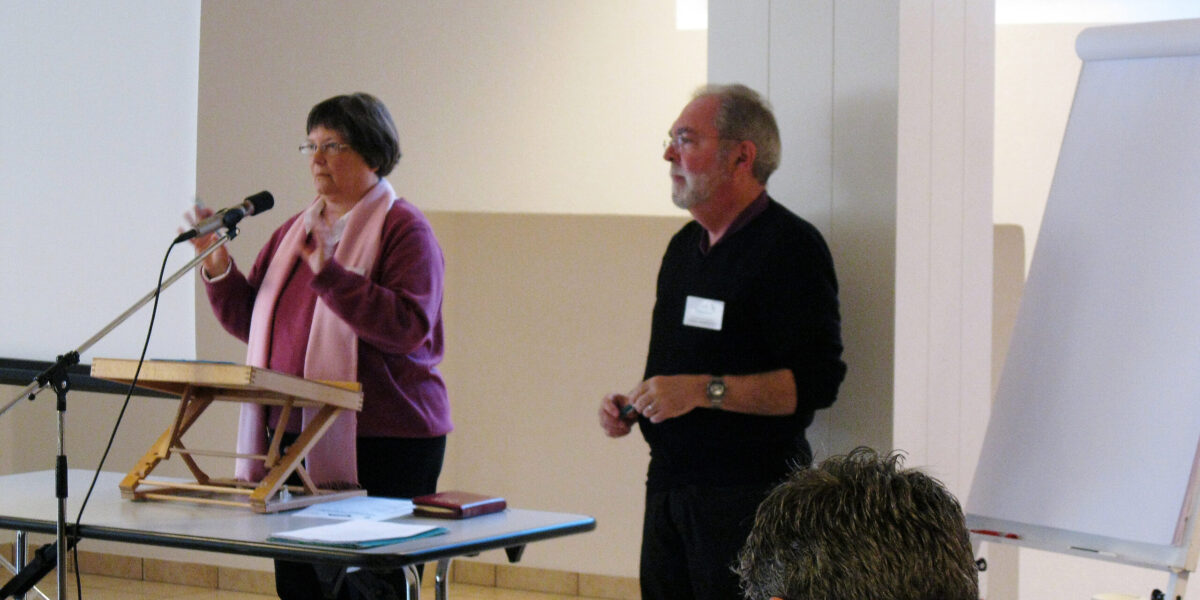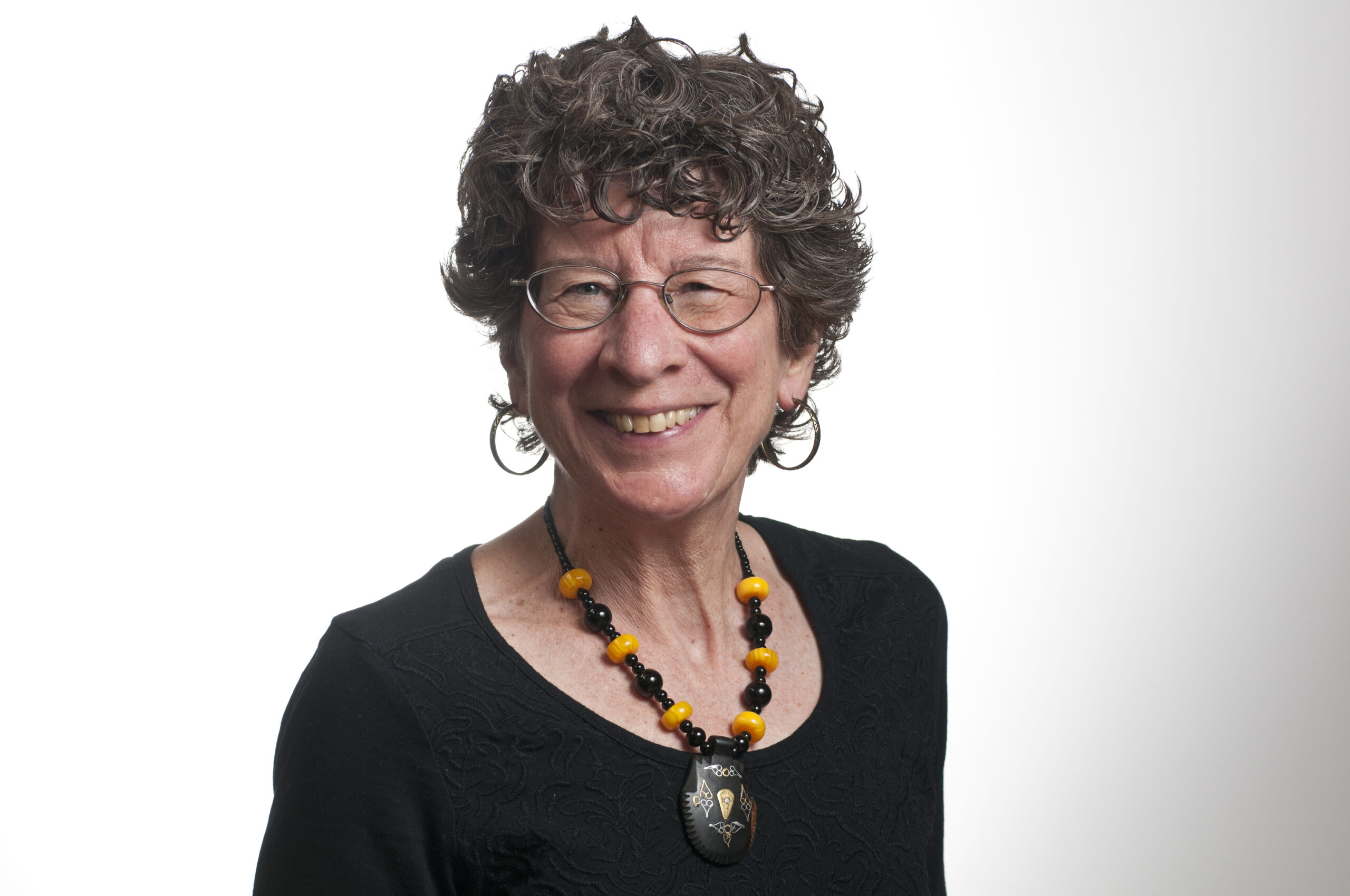ELKHART, Indiana (Mennonite Mission Network) – Linda Oyer first traveled to France to buy drugs in 1970. It turned out to be a lonely place for a young woman in knee-high moccasins and an army jacket with a black-fist logo.
Dejected, she phoned a missionary couple in Paris, friends of her parents. They told her about a place in the Swiss Alps where she could stay, free of charge. Though it sounded too good to be true, Oyer explored the possibility and found herself at L’Abri, a community founded by Edith and Francis Schaeffer. This community, committed to living out biblical truths in daily life, was gathered for a meeting when she arrived.
"As I entered the room, I looked around for someone I could identify with," Oyer said. "I saw this cute little man with long hair and knickers sitting on the floor. When I sat down beside him, he said, ‘I like your moccasins.’"
This was the first of many conversations that Oyer had with Francis Schaeffer. What started with a comment on her footwear soon turned to the meaning of life and the essential Christian message. By the end of the week, Oyer decided not to go through with the drug purchase. She wanted to follow Jesus instead.
She eventually returned to France to work part-time in a home for unwed mothers and part-time for an independent Bible church. When two French Mennonite families joined the Bible church, there was a theological "click" for Oyer. "I found a whole people who believed as I do. I found my home," Oyer said.
From 1988-2018, Oyer worked through Mennonite Mission Network and one of its predecessor agencies, Mennonite Board of Missions, in academic settings, as staff of the Paris Mennonite Center, and as part of the pastoral team at Lamorlaye Mennonite Church in one of the Paris suburbs. She taught at the Vaux-sur-Seine Evangelical Seminary (near Paris) and the Theological Seminary Bienenberg (near Basel, Switzerland). Bienenberg offers the only Anabaptist seminary-level program in the French language. Oyer served as Bienenberg’s academic dean and was instrumental in working with French and Swiss Mennonites to create EFraTA. This Bienenberg program, begun in 2003, is designed to allow people with full-time employment to pursue theological studies over a four-year period.
Oyer also co-founded an organization called Companions on the Way that offers a three-year spiritual direction program and spiritual retreats. The program that began with one group of 13 people now has three centers and more than a hundred people trained as spiritual directors.
In her work with the Women in Leadership organization, Oyer has empowered women through conferences and retreats throughout French-speaking Europe.
After earning her doctorate in New Testament theology at the Catholic Institute of Paris, Oyer authored or contributed to 10 books written in French. She continues to write.
Oyer summed up her 30 years of ministry with two words – mystery and diversity. As Mark 4:26-27 compares God’s kingdom to seed scattered on the ground, mysteriously growing as the sower goes about her daily life, so Oyer was unaware of what God was doing through her.
"There was no coaxing of growth, no pushing or pulling. God was working in profound ways to bring about new creation even when I could not yet see it. It has remained a mystery as to how it all happened," Oyer said.
When Oyer talks about not seeing, it has more than figurative meaning. Since 2012, she has lived with ocular toxoplasmosis, a debilitating visual impairment due to parasites in her eyes. Having lost sight in one eye and experiencing a significant decrease in vision in the other eye, caused her to reduce her reading. It also made travel on public transportation for lectures and conferences more difficult.
Oyer defines mission as partnering with God in scattering the values that Jesus modeled, kingdom seeds that bear witness to the new creation.
"Sometimes the seeds seem so insignificant compared to the resulting growth," Oyer said. "Yet, this does not mean that our role is insignificant. It is just that we are not the principal actor in the story. God is."
With only 3 percent of the French population being Protestant, there are not many congregations from which to choose. So, often a local church has great diversity in culture, theology and spirituality. During her church experience in France, Oyer evolved in the way she thought about unity and diversity.
"I started out with a secret desire that there would be unity without diversity," Oyer said. "Then the relationship between these two words developed into unity despite diversity."
In this stage, she saw the church as one body, but diversity was still seen as something that hindered unity and was to be overcome. From there, Oyer’s thinking relaxed into a position of unity in diversity, and finally she came to celebrate unity through diversity.
"We need each other with our differences in order to grow into the ‘measure of the full stature of Christ’ described in Ephesians 4:13," Oyer said.
Now, Oyer’s first question is, "What does this person see that I do not see?" Or, "What concern does the other have that I need to hear?" She contrasts this to the first question that many Christians ask of others, "Where is this person wrong?"
Oyer officially ended her ministry through Mission Network in March 2018, but she has continued to preach in congregations in the United States, and will travel to French-speaking Europe three times per year to continue her teaching at Bienenberg and in the spiritual direction program. She will depart for France in mid-March for the second of these trips that are financed by a group of French Christians.








